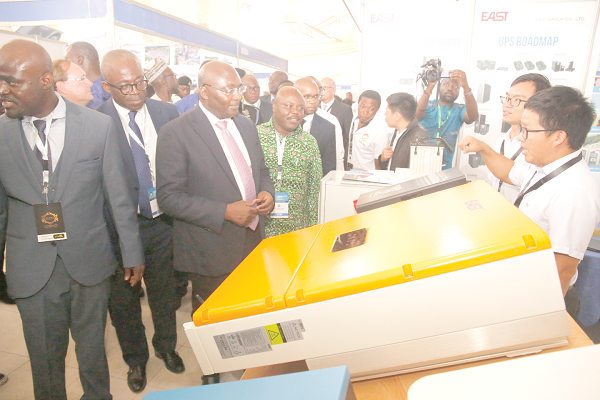
Fourth Ghana Renewable Energy Fair underway in Accra
The Vice-President, Dr Mahamudu Bawumia, has charged the Energy Commission to liaise with other stakeholder institutions to regulate and formalise the entire value chain of the wood fuel industry
“I urge the Energy Commission to work in collaboration with the relevant stakeholders, such as the Forestry Commission, to finalise the regulation aimed at streamlining the various activities of the wood fuel industry,” he emphasised.
Dr Bawumia gave the directive when he opened the fourth Ghana Renewable Energy Fair in Accra yesterday.
The three-day conference and exhibition, which is being organised by the Energy Commission, in collaboration with the Ministry of Energy, is on the theme: “Renewable energy: Exploiting energy resources at the district level”.
The fair is expected to shape the conversation on integrating renewable energy into the country’s energy mix and serve as a platform for collaboration among the government, the private sector and civil society towards that end.
It is also to promote renewable energy technologies and create linkages among the various stakeholders in the renewable energy space, such as researchers, entrepreneurs, industries and consumers.
Charcoal and firewood
Considering the manner in which the country’s forests were ravaged by “
“It is crucial for us, as a nation, to ensure that we do not further damage our environment through indiscriminate felling of trees for firewood and charcoal,” he added.
The Vice-President said since the majority of the population used wood fuel for cooking, it was important that the needs of that segment of society were properly addressed.
“I am, therefore, pleased to know that there are initiatives underway to ensure that charcoal and firewood cook stoves used in Ghana are energy-efficient and generate lower toxic emissions,” he
He pointed out that charcoal and firewood were and would continue to be dominant cooking fuel in the country until rural incomes increased significantly to support a wholesale switch to Liquified Petroleum Gas (LPG) or other clean fuels.
Solar energy
Dr Bawumia announced that the government was also to promote the development of cost-effective, utility-scalable solar energy projects to accelerate the development of mini-grid solutions in off-grid and island communities for lighting, irrigation and other economic activities.
The projects, he said, would be subject to competitive bidding to adopt the most efficient technologies and also achieve value for money.
To that end, he said, the government was already supporting the Volta River Authority (VRA) to develop two utility-scale PV plants for a total of 12 megawatts (MW) in the Upper West Region and a 75MW wind power plant at Anloga in the Volta Region, adding that it was the goal of the government to bring down the cost of electricity generation to under 10 United States (US) cents per kilowatt hour in order to make electricity affordable for all.
He said renewable energy-powered mini-grid systems provided the answer for the problem and added that the government had so far built five mini-grid systems in five island communities to supply the indigenes with electricity.
The Vice-President gave an assurance that the government would continue to pursue renewable energy-based mini grid electrification to provide 24-hour electricity supply for productive use on islands and in remote communities.

Board Chairman
The Board Chairman of the Energy Commission, Professor George Hagan, said the fair was instituted to respond to the responsibilities assigned to the commission in the Renewable Energy Act 832, which seeks to develop renewable energy in the country and protect the environment.
He added that it would also help focus attention on the harnessing of energy resources in districts to give support to the government’s One-district, One-factory (1D1F) and the Planting for Food and Jobs programmes.
District-level industries and agricultural projects, Prof. Hagan said, required cheap and reliable energy to be sustainable and profitable and the only way to ensure that was to use renewable local resources.